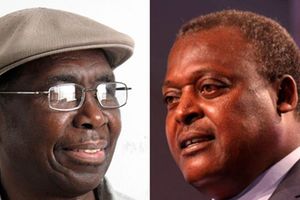Premium
Outrage after Cameroon detainee dies chained to hospital bed

What you need to know:
- Tangem Thomas Nganyu, 57, a former monk and metal sheet engineer died at the Yaounde Central Hospital on Wednesday, chained to his hospital bed, his lawyer, Barrister Nicodemus Amungwa Tanyi said.
- Reports say he was arrested in Buea, in the Southwest region over three years ago and whisked to an overcrowded maximum security prison in the capital where he fell ill.
- Tsi Conrad, one of the detainees of the Anglophone crisis currently serving a 15-year jail sentence, said Tangem died from pain and misery.
Yaounde,
An avalanche of condemnation from human rights advocates has followed new of the death of a Cameroonian detainee under shocking circumstances.
Tangem Thomas Nganyu, 57, a former monk and metal sheet engineer died at the Yaounde Central Hospital on Wednesday, chained to his hospital bed, his lawyer, Barrister Nicodemus Amungwa Tanyi said.
“Tangem died in chains to the satisfaction of the prison and justice administrators,” the lawyer said.
Tangem was one of hundreds of English speakers arrested in the wake of a bloody conflict in the country’s two English speaking regions of the Northwest and Southwest, where armed separatists have been fighting since 2017 to create an independent Anglophone state called Ambazonia.
NEGLECT CLAIM
Reports say he was arrested in Buea, in the Southwest region over three years ago and whisked to an overcrowded maximum security prison in the capital where he fell ill.
Tangem’s family said prison authorities neglected his illness until late last month when he was rushed to the hospital after his condition deteriorated.
Images of him cuffed to a hospital bed despite his poor health inundated social media platforms prior to his death.
The Centre for Human Rights and Democracy in Africa (CHRDA) condemned the poor treatment of the detainee who it said was arbitrarily arrested and detained in very poor conditions, leading to worse state.
“CHRDA is concerned about the fact that he was unable to get proper medical attention, a right enshrined under the Universal Declaration of Human Rights and the Cameroon Criminal Procedure Code,” the organisation said in a statement.
“We call on Cameroonian prison authorities to provide better medical services to inmates and not subject them to any form of inhumane and degrading treatment,” CHRDA said further.
Tsi Conrad, one of the detainees of the Anglophone crisis currently serving a 15-year jail sentence, said Tangem died from pain and misery.
“Without judgment, he prayed to go home. Three years behind bars in a dungeon of pain, hope made way for delusion. For nothing, Pa Tangem Thomas died in body but his soul now looks from above at his foe,” Tsi wrote from jail.
The government is yet to make an official statement about what observers describe as inhumane treatment.
JOURNALIST’S DEATH
Tangem’s death comes barely two months after the government confirmed that another detainee of the Anglophone crisis, Samuel Ajiekah Abuwe alias Samuel Wazizi, died in military custody in Yaounde.
Police arrested the journalist on August 3, 2019 in the South West region. He was transferred to military custody on August 7 then ferried to the nation’s capital Yaoundé six days later, according to the military.
Though he died on August 17, 2019, his death was only confirmed in June. The military also denied accusations that he was tortured to death, saying he died "as a result of severe sepsis."
Commentators say the two deaths show the precarious conditions which some inmates arrested in connection to the socio-political crisis in the Anglophone regions are going through in detention facilities across the country.
The two English speaking regions of Cameroon have remained volatile since a peaceful demonstration by teachers and lawyers, over perceived marginalisation, morphed into an armed conflict in 2017.
Over 3,000 civilians and hundreds of security forces personnel have been killed in the Anglophone regions since the crisis started, according to Human Rights Watch.
The UN estimates that at least 700,000 others are internally displaced.





